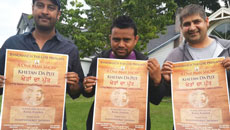On Friday, October 24, the Dhahan Prize will host a public reading at SFU Surrey from 6:30 – 8:00 p.m., followed by a reception. Prize winners will read from their winning books in Punjabi, with translation to English.
The evening is co-presented with SFU World Literature Program, and will include a question and answer portion, as well as a reception to mingle with our honoured guests.
The next day, on Saturday, October 25, the winners of the Dhahan Prize in Punjabi Literature will be honoured at a gala reception at the Museum of Anthropology at University of British Columbia. Please RSVP to contact@dhahanprize.com. More information can be found at ww.dhahanprize.com.
The Dhahan Prize celebrates the rich culture and transnational heritage of Punjabi language and literature by awarding a yearly prize for excellence in Punjabi fiction. The Prize mission is to inspire the creation of Punjabi literature across borders, bridging Punjabi communities around the world and promoting Punjabi literature on a global scale.
The Dhahan Prize awards $25,000 CDN annually to one “best book” published in either of the two Punjabi scripts, Gurmukhi or Shahmukhi. Two runner-up prizes of $5,000 CDN are also awarded, with the provision that both scripts are represented among the three winners.
The Dhahan Prize is awarded by Canada India Education Society (CIES) in partnership with the Department of Asian Studies in the Faculty of Arts at University of British Columbia (UBC). Learn more at www.dhahanprize.com.
The Prize Process
UBC’s Professor Anne Murphy, with advice and guidance from the Prize Advisory Committee, designed the process, adjudication and administration of the Prize in its initial form.
Professor Murphy’s scholarly experience with Punjabi culture and literature, and with the adjudication and management of literary and book prizes (both in English and Punjabi), coupled with 10 years of experience working with museums and other non-profit organizations on related projects, helped devise a process that would foster engaged and ethical adjudication.
There are three juries for the prize adjudication process: one to choose Shahmukhi books, one for Gurmukhi books, and one Central Jury that determines the winner. There is no overlap among the juries and the names of members are not disclosed until after adjudication is complete.
2014 Jury Members
Central Jury
Professor Raghbir Singh Sirajana, Central Jury Chair and Professor at Panjab University, Chandigarh
Professor Niranjan Tasneem, Author and Professor Emeritus GHG Khalsa College, Saddhar
Mushtaq Soofi, Poet, Scholar and Chairman of the Pakistan Punjabi Adabi Board
Shahmukhi Jury
Dr. Furrukh Khan, Shahmukhi Chair and Associate Professor, Lahore Institute for Management Sciences
Professor Ali Qasmi, Historian and Scholar
Iqbal Qaiser, Historian, Poet and Author
Gurmukhi Jury
Professor Rana Nayar, Gurmukhi Jury Chair and Professor at Department of English & Cultural Studies, Panjab University, Chandigarh
Professor Tejwant Gill, Retired Professor of English, Guru Nanak Dev University, Amritsar (India)
Professor Dalip Kaur Tiwana, Author and Retired Professor of Punjabi at Punjabi University Patiala
Winner Profiles
1. First Prize: Khali Khoohan Di Katha (Novel) by Avtar Singh Billing
Avtar Singh Billing is one of the leading fiction writers of the present generation. Khali Khoohaan di Katha (The Story of Empty Wells) is his sixth novel. In this work, Billing takes the reader into his confidence and unravels the skein of his tale effortlessly. The drama unfolds in a rural setting, within the ongoing familial interaction of two brothers married to two sisters.
Pashi, the grandson of the elder brother Charan Singh, spends his summer vacation happily in the remote village of his maternal grandparents. He is a keen observer of the way of life, and dispassionately narrates the ups and downs of four generations in the extended families of Charan Singh and Bishan Singh.
He never forgets the dictum of his maternal grandfather, that the wells of money are emptied if there is no steady flow of income in the family. It is no surprise, then, that he finds, towards the end of the novel, that ‘Happiness is an occasional episode in the general drama of pain.’
Through its powerful narrative and careful description, this novel brings into focus the social, economic and cultural changes witnessed in rural Punjab during the last eight decades.
The story of four generations woven into the novel is unique in its fictional presentation, and yet remains true to the lived experience of a joint peasant family. The novel is simply superb in its realistic development of characters and artistic use of language. The local regional culture of the Dhaha area in Punjab comes alive in all its manifestations.
Avtar Singh Billing was born in 1952 in village Seh, near Khanna in Distt. Ludhiana, Punjab, India. He holds an MA English and B.Ed, and is a retired English lecturer. He has published four short story collections, three books for children, and six novels, including the winning book of the inaugural Dhahan Prize in Punjabi Literature in 2014.
Billing has received several awards for his writing, including the Punjab Government Language Department’s Nanak Singh Award 2003 for best novel of the year for Khere Sukh Vihre Sukh. He received the same award in 2008 for his novel Ihna Rahan Utte. His novel Pat Kumla Gaye was awarded the Best Book of the Year 2010 award by Nawan Zamana Jallandhar. In 2014 he was honoured with the Charan Das Award for Total Contribution in Literature from the Punjabi Sahit Academy Ludhiana.
2. Runner up: Ek Raat Da Samunder (short stories collection) by Jasbir Bhullar
Jasbir Bhullar is a well-known storyteller. He arouses the reader’s curiosity with just the opening sentence of his short story. He proceeds then in a casual manner as if he is in search of a theme. Groping in the dark for a while, he happens to see light at the end of the tunnel. Henceforth he shows the reader what is taking place in the story, instead of taking recourse to narrative mode.
This process of telling and showing makes such an impact on the mind of the reader that he finds himself drawn imperceptibly into a magical world. At the end of the narrative, both the writer and the reader find themselves in a kind of wonderland.
Ek Raat Da Samunder, the short story collection, presents various aspects of human life in a fascinating manner. In thefirst short story, the sea assumes at one night the proportions of the Flood of Noah by inundating the islands of Andaman and Nicobar.
The loss of his family was unbearable for Major Kulbir, shortly after his posting at such an unpredictable place. But one fine morning he becomes aware of the fact that an ending can, in the long run, bring about a new beginning. Similarly, in the story, “Jadon Kujh Nahin Hunda,” he highlights the point that true living can be experienced only when one is exposed to imminent danger.
In some of his short stories, he delineates the joys and sorrows of children who are eager to find their dreams translated into reality. Overall, it is an important and enjoyable contribution to modern Punjabi literature.
Colonel Jasbir Bhullar was born in 1941. His family hails from Bhullar Chilla, Amritsar, and his father was a land record keeper for the area. As a young man, Bhullar joined the Indian Army, where he retired as a Colonel.
An accomplished writer, Bhullar is a Shiromani Bal Sahit Lekhak of Punjab, and has authored over 40 books of fiction, including children’s literature. He holds an MA in Punjabi Literature from Punjab University.
3. Runner Up: Kabutar, Banaire te Galian (short stories collection) by Zubair Ahmed
Zubair Ahmad’s short stories in his book Kabutar, Banaire Te Galian are inspired by both the usual and unusual, by what actually happens and what may happen. Such happenings, tangible and intangible, provide the material that can become stuff of artistic narrative.
Even non-happenings like dreams are, for him, nothing less than fragments of untold and untellable stories in need of narration and description. An important theme of Zubair’s stories is time; how it changes or transforms things, making the alive dead and the dead alive. But being a fiction writer, he does not conceive of time in abstraction. Rather we see time in terms of its effects, the pervasive marks it leaves on all aspects of life, both individual and collective. In his stories the forgotten past appears as a known and familiar territory, and the unforgettable present becomes a path leading to a deviously uncertain and uncertainly devious nowhere.
It is there that his characters dwell. Nostalgia evokes dreams and dreams beget nostalgia. Sensitively constructed stories with artistic care reveal what we live with at both a conscious and sub-conscious level, connected to a past we think we have lost, and disconnected from a future we have yet to understand. Ek Raat Da Samunder, the short story collection, presents various aspects of human life in a fascinating manner. In the first short story, the sea assumes at one night the proportions of the Flood of Noah by inundating the islands of Andaman and Nicobar.
The loss of his family was unbearable for Major Kulbir, shortly after his posting at such an unpredictable place. But one fine morning he becomes aware of the fact that an ending can, in the long run, bring about a new beginning. Similarly, in the story, “Jadon Kujh Nahin Hunda,” he highlights the point that true living can be experienced only when one is exposed to imminent danger.
In some of his short stories, he delineates the joys and sorrows of children who are eager to find their dreams translated into reality. Overall, it is an important and enjoyable contribution to modern Punjabi literature. Colonel Jasbir Bhullar was born in 1941. His family hails from Bhullar Chilla, Amritsar, and his father was a land record keeper for the area. As a young man, Bhullar joined the Indian Army, where he retired as a Colonel.
An accomplished writer, Bhullar is a Shiromani Bal Sahit Lekhak of Punjab, and has authored over 40 books of fiction, including children’s literature. He holds an MA in Punjabi Literature from Punjab University.
3. Runner Up: Kabutar, Banaire te Galian (short stories collection) by Zubair Ahmed
Zubair Ahmad’s short stories in his book Kabutar, Banaire Te Galian are inspired by both the usual and unusual, by what actually happens and what may happen. Such happenings, tangible and intangible, provide the material that can become stuff of artistic narrative.
Even non-happenings like dreams are, for him, nothing less than fragments of untold and untellable stories in need of narration and description. An important theme of Zubair’s stories is time; how it changes or transforms things, making the alive dead and the dead alive. But being a fiction writer, he does not conceive of time in abstraction.
Rather we see time in terms of its effects, the pervasive marks it leaves on all aspects of life, both individual and collective. In his stories the forgotten past appears as a known and familiar territory, and the unforgettable present becomes a path leading to a deviously uncertain and uncertainly devious nowhere. It is there that his characters dwell.
Nostalgia evokes dreams and dreams beget nostalgia. Sensitively constructed stories with artistic care reveal whatwe live with at both a conscious and sub-conscious level, connected to a past we think we have lost, and disconnected from a future we have yet to understand.



